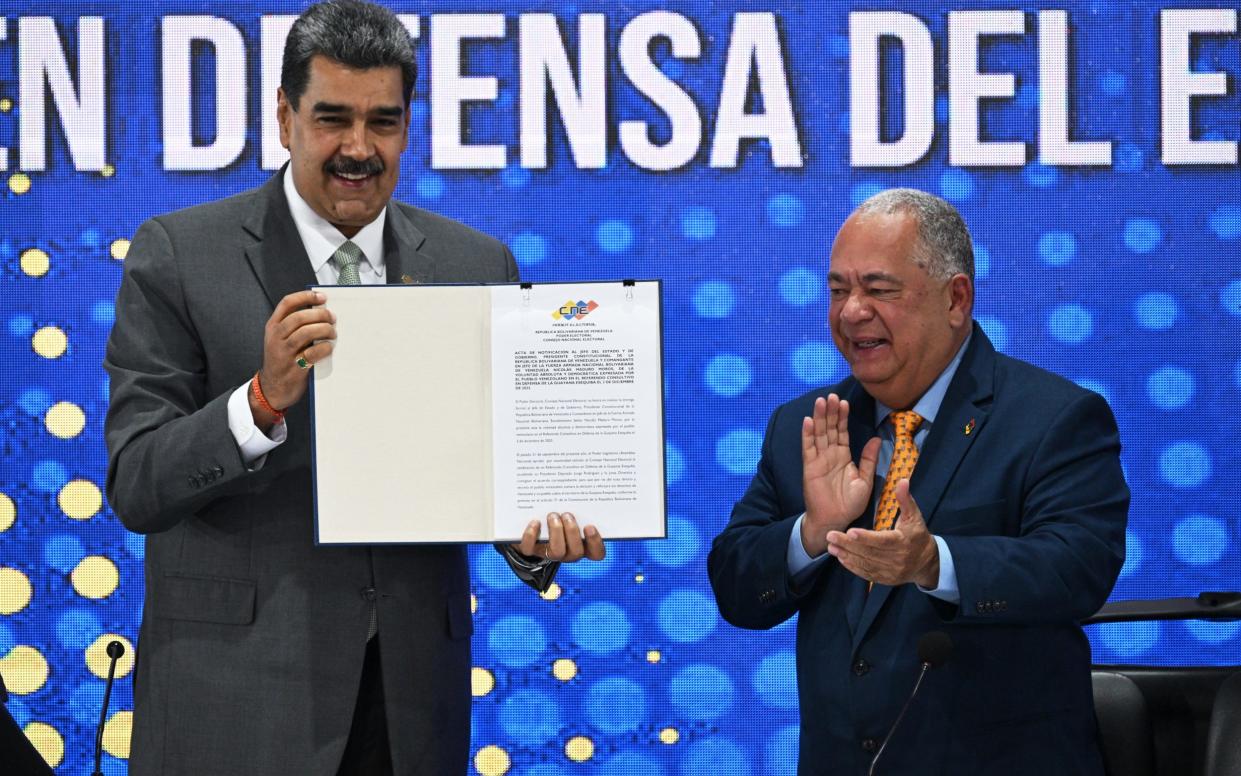US announces joint military flight drills as Venezuela threatens oil-rich Guyana region

- Oops!Something went wrong.Please try again later.
The United States announced joint military flight drills in Guyana on Thursday as soaring tensions with Venezuela prompted the UN Security Council to call an urgent meeting.
A border feud has been spiralling about the oil-rich Essequibo region, administered by Guyana for more than a century but also claimed by Venezuela, which is now seeking to bring the area under its rule.
The spat is rapidly drawing in the international community, with the American announcement of military exercises the latest sign that Washington is alarmed at the threat from Venezuela’s authoritarian Leftist government.
“In collaboration with the Guyana Defence Force, the US Southern Command will conduct flight operations within Guyana on Dec 7,” the US Embassy in Georgetown said in a statement.
It said that the flights are part of “routine engagement and operations to enhance security partnership” with Guyana.
On Friday, the UN Security Council will meet behind closed doors in New York to discuss the tensions, according to an updated official schedule.
In a letter, Hugh Todd, the foreign minister of Guyana, asked the council’s president to “call urgently for a meeting” to discuss “a grave matter that threatens international peace and security”.
Mr Todd said that Venezuela’s conduct “plainly constitutes a direct threat to Guyana’s peace and security, and more broadly threatens the peace and security of the entire region”.
In Brazil, Luiz Inacio Lula da Silva, the country’s president, also voiced “growing concern” about the tension on his country’s northern border, telling a summit of the Mercosur regional bloc: “If there’s one thing we don’t want here in South America it’s war.”
On Wednesday, the Brazilian army said that it was reinforcing its presence in the northern cities of Pacaraima and Boa Vista as part of efforts “to guarantee the inviolability of the territory.”
The long-running dispute over Essequibo – which comprises some two-thirds of Guyanese territory and is home to 125,000 of Guyana’s 800,000 citizens – has intensified since ExxonMobil discovered oil there in 2015.
Nicolas Maduro, the Venezuelan president, upped the ante in recent days after claiming to have received overwhelming support in a referendum held on Sunday on Essequibo’s fate.
Litigation is pending before the International Court of Justice (ICJ) in The Hague on where the region’s borders should lie, but Venezuela does not recognise the court’s jurisdiction in the matter.
In a phone call with Irfaan Ali, the Guyanese president, on Wednesday, Antony Blinken, the US secretary of state, reaffirmed his nation’s “unwavering support for Guyana’s sovereignty” and called for a peaceful resolution.
Guyana, a former British and Dutch colony, insists that Essequibo’s frontiers were determined by an arbitration panel in 1899.
But Venezuela claims that the Essequibo river to the region’s east forms a natural border recognised as far back as 1777.
Caracas called a referendum after Guyana began auctioning oil blocks in Essequibo in August.
Voters were asked to respond to five questions, including whether Venezuela should reject the 1899 arbitration decision, as well as the ICJ’s jurisdiction.
They were also asked whether Venezuelan citizenship should be granted to the people – currently Guyanese – of a new “Guyana Esequiba State”.
Officials in Caracas said that 95 per cent of voters supported the measures.
A ‘direct threat’ against Guyana
On Tuesday, Mr Maduro proposed a bill to create a Venezuelan province in Essequibo and ordered the state oil company to issue licences for extracting crude in the region.
Emboldened by the referendum result, the president also gave an ultimatum to oil companies working under concessions issued by Guyana to halt operations within three months.
Mr Ali called Mr Maduro’s statements a “direct threat” against his country.
Guyana’s armed forces were on “alert,” Mr Ali added in a rare address to the nation late on Tuesday, and were in contact with “partners” including the United States.
On Wednesday, a Guyanese army helicopter with seven people on board was reported missing near the border but an official said there was “no information to suggest that” Venezuela had been involved.
On Wednesday, Venezuela also confirmed that it had arrested an American citizen, Savoi Jadon Wright, on accusations of “conspiring” with ExxonMobil to stop the referendum. US media said that the arrest was made on Oct 24.
Last week, two days before the referendum, the ICJ ordered Venezuela to “refrain from taking any action which would modify the situation that currently prevails in the territory in dispute”.
It did not, however, grant an urgent request by Guyana to stop the vote.

